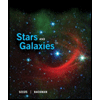
Concept explainers
Whether the statement is true or false.
Answer to Problem 1QAP
The statement is True.
Explanation of Solution
Cosmological constant is the term related to dark energy; it was given by
However, after Hubble’s theory of expansion, the theory changed; Hubble theory explains that universe is expanding in nature. Space can have non-zero energy even there is no matter.
This empty space energy named as dark energy creates the repulsive force that can expand the universe. Cosmological constant is an example of dark energy.
It means cosmological constant always acts against the gravity that accelerates the expansion of universe.
Conclusion:
The cosmological constant explains the acceleration in expansion of universe. Thus, the statement is true.
Want to see more full solutions like this?
Chapter 16 Solutions
Understanding Our Universe
- Is a cosmologist an astronomer? Is an astronomer a cosmologist? Why do you think so?arrow_forwardDescribe at least two characteristics of the universe that are explained by the standard Big Bang model.arrow_forwardWhat is the difference between hot dark matter and cold dark matter? How does this difference affect cosmology?arrow_forward
- What does the term Hubble time mean in cosmology, and what is the current best calculation for the Hubble time?arrow_forwardCosmological redshift caused by the expansion of space itself is not quite the same as the redshift caused by the physical motion of a light source away from an observer (that principle is more commonly known by its name, the hint: two words}).arrow_forwardI'm doing a debate about Kalam cosmological. I need to have an example of something out of nothing (Or maybe we can't prove the cause)? Can you help give 5 modern physics example?arrow_forward
- What is the difference between hot dark matter and cold dark matter? What difference does that make to cosmology?arrow_forwardExplain the evidence that supports the big bang theory.arrow_forwardThe matter density in the Universe today is ?m=2.7×10−27kgm−3. What would be the value of the density parameter, Ω0, if the Hubble constant had the value H0 = 38 km/s/Mpc?arrow_forward
- Which one best explains dark matter? The resurgence of Newtonian physics or Einstein’s cosmological constant?arrow_forwardThe cosmic microwave background consists of: huge clouds of dark matter interspersed with equally huge clouds of H and He enormous cold voids separating warmer filaments of young protostas and protogalaxies denser areas of slightly warmer Hydrogen mixed with slightly less dense areas of slightly cooler Helium an enormous number of photons, particles of light that emerged after the Big Bang atoms of H and He, dark matter, and an immense amount of energy MacBook Air DII DD 30 D00 000 F7 F8 F9 F4 F5 F6 & 4 8 R Yarrow_forwardExplain why the universe cannot be older than the Hubble time.arrow_forward
 Foundations of Astronomy (MindTap Course List)PhysicsISBN:9781337399920Author:Michael A. Seeds, Dana BackmanPublisher:Cengage Learning
Foundations of Astronomy (MindTap Course List)PhysicsISBN:9781337399920Author:Michael A. Seeds, Dana BackmanPublisher:Cengage Learning Stars and Galaxies (MindTap Course List)PhysicsISBN:9781337399944Author:Michael A. SeedsPublisher:Cengage Learning
Stars and Galaxies (MindTap Course List)PhysicsISBN:9781337399944Author:Michael A. SeedsPublisher:Cengage Learning AstronomyPhysicsISBN:9781938168284Author:Andrew Fraknoi; David Morrison; Sidney C. WolffPublisher:OpenStax
AstronomyPhysicsISBN:9781938168284Author:Andrew Fraknoi; David Morrison; Sidney C. WolffPublisher:OpenStax Stars and GalaxiesPhysicsISBN:9781305120785Author:Michael A. Seeds, Dana BackmanPublisher:Cengage Learning
Stars and GalaxiesPhysicsISBN:9781305120785Author:Michael A. Seeds, Dana BackmanPublisher:Cengage Learning



